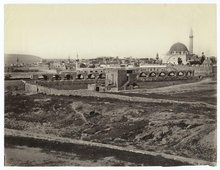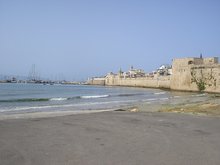Akko
|
|

Akko (Hebrew עַכּוֹ, Standard Hebrew ʻAkko, Tiberian Hebrew ʻAkkô; Arabic عكّا ʻAkkā; also, Acre, Accho, Acco, and St.-Jean d'Acre), is a city in Western Galilee in the North District, Israel. According to the Israel Central Bureau of Statistics (CBS), at the end of 2003 the city had a total population of 45,600. It stands on a low promontory at the northern extremity of the Bay of Acre, 95 miles N.N.W. from Jerusalem.
It was long regarded as the "Key of Palestine," on account of its commanding position on the shore of the broad coastal plain that joins the inland plain of Esdraelon, and so affords the easiest entrance to the interior of the country.
| Contents |
Notable sights and places in Akko
The old city of Akko has been designated by UNESCO as a World Heritage Site and contains, among other sites, a tunnel leading to a 13th-century fortress of the Knights Templar.
Since the 1990s there are vast works of archeological excavations and preservations of ancient structures in progress. The works are carried out by the Old Acre Development Company (OADC).
The Walls
The first notable thing which comes to sight when coming to Akko is the heavy land defense wall, built north and east to the city. This wall was built in 1800-1814 by Jezzar Pasha (called by the locals Al-Jezzar) and his Jewish advisor Haim Farkhi. This is a modern counter artillery fortification which includes a thick defensive wall, a dry moat, cannons' outposts and three Burges (large defensive towers).
In 1750, Daher El-Omar, the ruler of Akko, utilized the remnants of the Crusader walls as a foundation for his walls. They were reinforced between 1775 and 1799 by Jezzar Pasha and survived Napoleon's siege. The wall was thin, its height was 10-13 metres and its thickness was only 1 metre.
The sea wall, which remained mostly complete, is the original El-Omar's wall that was reinforced by al-Jezzar. However, the land wall which survived Napoleon's siege was replaced in 1800 with a modern wall by al-Jezzar.
See also: Akko Walls (http://www.akko.org.il/English/Trips/Napoleon-Walls.asp) (OADC)
The Great Mosque
The Al Jezzar mosque was built by Jezzar Pasha (d. 1804) from materials taken from Caesarea Palaestina: his tomb is within. Acre is the seat of the head of the Bahá'í Faith.
Hamam al Basha
Hamam is a hot Turkish bath. Akko's Hamam is notable mainly because it was used by the Irgun as bridge to break into the citadel's prison.
The Citadel
The current building which consists the citadel of Akko is an Ottoman forification, built on the foundation of the Hospitallerian citadel. The citadel was part of the city's defensive formation, reinforcing the northern wall.
During the 20th century the citadel was used mainly as prison and a gallows. During the British mandate period, activists of Jewish Zionist resistance movements were held prisoner there; some were executed there. In 1947, members of the Irgun broke into the citadel and released many prisoners.
Today, the citadel of Akko contains the following:
- The Ottoman fortifications (including the tower and the moat).
- Akko Old City Visitor Centers.
- The "enchanted garden": a new garden that is planted according to historical description of the garden that was there during the Crusades period.
- Akko's British prison and the gallows.
- Memorial for Jewish resistance fighters, executed by the British mandate.
- A Museum for the Jewish resistance prisoners, מוזיאון אסירי המחתרות .
- Knights' Halls (see below).
As of August 2004, the citadel is partly closed, due to preservation works.
The Knights' Halls
Under the citadel and prison of Akko, archeological excavations revealed a complex of halls, which was built and used by the Hospitallers Knights. This complex was a part of the Hospitallers' citadel, which was combined in the northern wall of Akko.
The complex includes:
- Six semi-joint halls.
- One large hall, recently excavated.
- Dungeon.
- Dining room (with an underground tunnel).
- Posta and Crypta (remains of an ancient Gothic church).
History
Few towns have had a more chequered or calamitous history. Of great antiquity, Akko is probably to be identified with the Aak of the tribute-lists of Thutmoses III (c. 1500 B.C.), and it is certainly the Akka of the Amarna letters. To the Hebrews it was known as Acco (Revised Version spelling), but it is mentioned only once in the Old Testament, namely Judges 1:31, as one of the places from which the Israelites did not drive out the Canaanite inhabitants. Theoretically it was in the territory of the tribe of Asher, and Josephus assigns it by name to the district of one of Solomon's provincial governors. Throughout the period of Hebrew domination, however, its political connections were always with Syria rather than with the Philistines: thus, about 725 BC it joined Sidon and Tyre in a revolt against Shalmaneser V. It had a stormy experience during the three centuries preceding the Christian era.
The Greek and Roman Periods
The Greek historians name it Ake (Josephus calls it also Akre); but the name was changed to Ptolemais, probably by Ptolemy Soter, after the partition of the kingdom of Alexander the Great.
Strabo refers to the city as once a rendezvous for the Persians in their expeditions against Egypt. About 165 BC Simon Maccabaeus defeated the Syrians in many battles in Galilee, and drove them into Ptolemais. About 153 BC Alexander Balas, son of Antiochus Epiphanes, contesting the Syrian crown with Demetrius, seized the city, which opened its gates to him. Demetrius offered many bribes to the Maccabees to obtain Jewish support against his rival, including the revenues of Ptolemais for the benefit of the Temple in Jerusalem, but in vain. Jonathan threw in his lot with Alexander, and in 150 BC he was received by him with great honour in Ptolemais. Some years later, however, Tryphon, an officer of the Syrians, who had grown suspicious of the Maccabees, enticed Jonathan into Ptolemais and there treacherously took him prisoner.
The city was also assaulted and captured by Alexander Jannaeus, by Cleopatra VII of Egypt and by Tigranes II of Armenia. Here Herod built a gymnasium, and here the Jews met Petronius, sent to set up statues of the emperor in the Temple, and persuaded him to turn back. St Paul spent a day in Ptolemais (Acts 21:7).
The Arab Period and Crusades
The Arabs captured the city in AD 638, and held it until they lost it to the crusaders in 1110. The latter made the town their chief port in Palestine. It was re-taken by Saladin in 1187, besieged by Guy of Lusignan in 1189 at the Battle of Acre, and again captured by Richard the Lionheart in 1191. It then became the capital of the remnant of the Kingdom of Jerusalem. In 1229 it was placed under the control of the Knights Hospitaller (whence came one of its alternative names), but was finally lost by the Franks to the Mameluks in 1291. The Ottomans under Sultan Selim I captured the city in 1517, after which it fell into almost total decay. Maundrell in 1697 found it a complete ruin, save for a khan occupied by some French merchants, a mosque and a few poor cottages.
The Ottoman Period
Towards the end of the 18th century it revived under the rule of Daher El-Omar, the local sheikh: his successor, Jezzar Pasha, governor of Damascus, improved and fortified it, but by heavy imposts secured for himself all the benefits derived from his improvements. About 1780 Jezzar peremptorily banished the French trading colony, in spite of protests from the French government, and refused to receive a consul.
In 1799 Napoleon, in pursuance of his scheme for raising a Syrian rebellion against Turkish domination, appeared before Acre, but after a siege of two months (March--May) was repulsed by the Turks, aided by Sir Sidney Smith and a force of British sailors. Having lost his siege cannons to Smith, Napoleon attempted to lay siege to the walled city defended by Ottoman troops on 20 March 1799, using only his infantry and small-caliber cannons, a strategy which failed, leading to his retreat two months later on May 21.
Jezzar was succeeded on his death by his son Suleiman, under whose milder rule the town advanced in prosperity till 1831, when Ibrahim Pasha besieged and reduced the town and destroyed its buildings. On November 4, 1840 it was bombarded by the allied British, Austrian and French squadrons, and in the following year restored to Turkish rule.
The British Mandate
The citadel of Akko was used by the British as a prison and a gallows, mainly for political prisoners. Jewish underground movement activists, such as Zeev Jabotinsky and Shlomo Ben-Yosef (Irgun activist) were jailed in the citadel-prison of Akko. Ben-Yosef was the first Jew to be executed by the British mandate.
On May 4, 1947, the Irgun broke into the Akko citadel prison in order to release Jewish activist imprisoned there by the British. 27 inmates succeeded in escaping (20 from the Irgun and 7 from Lehi). 9 were killed and 5 were captured during the raid.
Despite the heavy toll in human lives, the action was described by foreign journalists as "the greatest jail break in history." The London Ha'aretz correspondent wrote on May 5:
- "The attack on Acre jail has been seen here as a serious blow to British prestige... Military circles described the attack as a strategic masterpiece."
The New York Herald Tribune wrote that the underground had carried out "an ambitious mission, their most challenging so far, in perfect fashion."
Prison break (http://www.jewishvirtuallibrary.org/jsource/History/Acre.html)
Under Israeli Rule (1948 and henceforth)
- Modern city outside of the Old City walls. See: Akko (modern city).
- Archeological reservation works and excavations. See: Old Acre Development Company.
Incomplete, need to elaborate
See also
See also: Israel, Palestine, Crusade, District of Acre.
People:
External Links
- Old City of Acre - The Official Website (http://www.akko.org.il/hebrew/main/default.asp) (Old Acre Development Company - OADC )
- Akko's History (http://www.jewishvirtuallibrary.org/jsource/vie/Acco.html) (Jewish Virtual Library)
- The Akko prison break (http://www.jewishvirtuallibrary.org/jsource/History/Acre.html) (Jewish Virtual Library)ar:عكا
af:Akko de:Akkon fr:Acre (Israël) gl:Acre he:עכו nl:Akko no:Acre (Israel) pl:Akka ru:Акка

